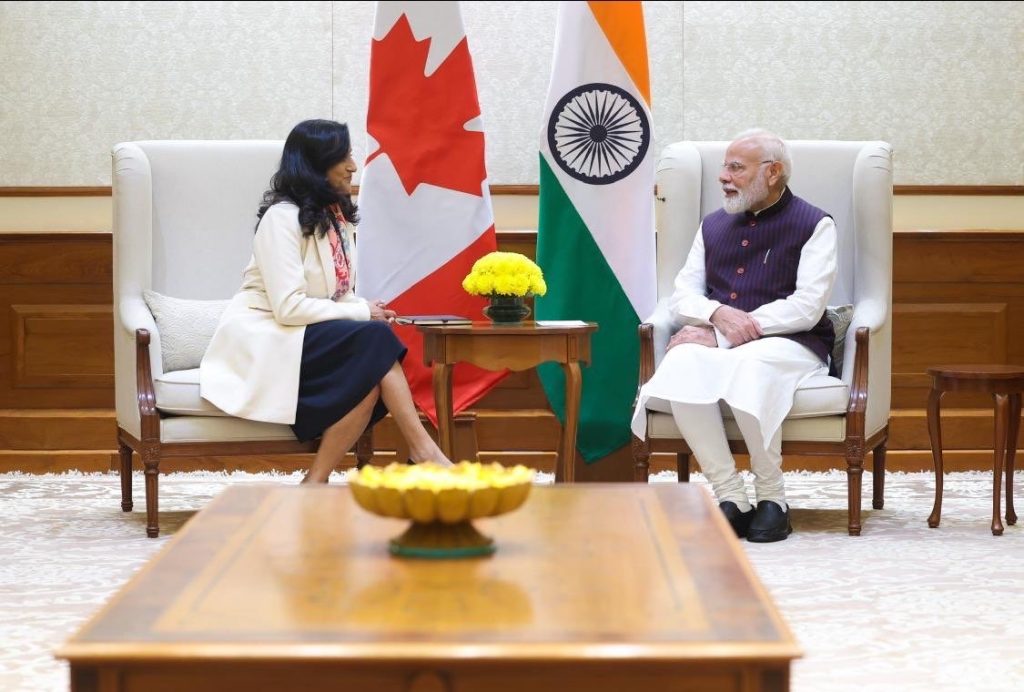Canadian FM Anita Anand Visit To Enhance India-Canada Bilateral Partnership: PM Modi

Canadian FM Anita Anand’s Visit Aims to Deepen India–Canada Bilateral Partnership: PM Modi
Introduction
Canadian Foreign Minister Anita Anand met Prime Minister Narendra Modi in New Delhi today as part of her official visit to India. Prime Minister Modi welcomed Ms. Anand and underscored that her visit would help inject renewed momentum into the India–Canada bilateral partnership, which has witnessed both challenges and opportunities in recent years.The meeting comes at a significant juncture, following PM Modi’s participation in the G7 Summit held in Canada in June 2025, where he had a productive meeting with Canadian Prime Minister Mark Carney.
I. Key Highlights of the Meeting
- Strengthening Bilateral Cooperation
- Prime Minister Modi reiterated the importance of enhancing collaboration in key sectors such as trade, investment, energy security, technology, agriculture, and people-to-people exchanges.
- Both sides expressed optimism about rebuilding trust and expanding engagement through institutional dialogues and ministerial-level interactions.
- Focus Areas of Discussion
- Trade and Economic Partnership: India emphasized the need for diversified supply chains, increased bilateral trade, and the potential revival of Comprehensive Economic Partnership Agreement (CEPA) discussions.
- Energy Cooperation: Focus on clean energy collaboration, including critical minerals, hydrogen, and renewable technologies.
- Innovation and Technology: Strengthening cooperation in AI, digital governance, and emerging technologies, where both nations have complementary strengths.
- Agriculture and Food Security: Enhanced partnerships in agri-technology, pulses trade, and sustainable farming practices.
- People-to-People Ties: Recognition of the strong Indian diaspora in Canada, which serves as a vital bridge between the two nations.
- Political and Diplomatic Significance
- The visit signals New Delhi’s commitment to pragmatic engagement with Ottawa, focusing on shared democratic values and mutual economic interests.
- It also reflects Canada’s intent to recalibrate its foreign policy priorities in the Indo-Pacific, acknowledging India’s growing strategic and economic weight.
II. Background: India–Canada Relations
- Historical Context
- Diplomatic relations between India and Canada were established in 1947. The partnership is rooted in shared democratic traditions, pluralism, and people-centric values.
- Over the decades, cooperation has expanded to include education, defense, nuclear energy, and development partnerships.
- Recent Developments
- In recent years, bilateral relations faced diplomatic strain due to political differences and diaspora-linked issues. However, the resumption of high-level dialogues and ministerial visits marks a course correction toward constructive engagement.
- Canada remains a major source of FDI in India, particularly in infrastructure, financial services, and renewable energy.
- Economic Overview
- Bilateral trade between India and Canada stood at over USD 9 billion in 2024–25.
- India is among Canada’s top 10 trading partners in Asia.
- Around 1.6 million persons of Indian origin live in Canada, playing a crucial role in fostering cultural and commercial ties.
III. Strategic Significance of the Visit
- Economic Reset:
The visit provides a platform to rebuild economic and diplomatic trust, paving the way for renewed dialogue on trade and investment frameworks. - Energy and Technology Cooperation:
As both nations transition toward clean energy and digital economies, collaboration in critical minerals, green hydrogen, and digital governance aligns with their mutual sustainability goals. - People-Centric Diplomacy:
Recognition of the Indian diaspora’s contribution and measures to facilitate smoother mobility of professionals and students are likely to further strengthen social linkages. - Indo-Pacific Convergence:
Both countries share a commitment to a free, open, and inclusive Indo-Pacific region, and cooperation under this framework could gain strategic depth.
IV. Analytical Perspective
The visit of Canadian Foreign Minister Anita Anand marks a diplomatic thaw and an attempt to rebuild mutual confidence. For India, Canada represents an important economic and technological partner in the North American and Indo-Pacific landscape.While past tensions have tested bilateral ties, both sides now appear inclined toward pragmatic cooperation, focusing on shared interests such as economic growth, clean energy, innovation, and global governance reforms.PM Modi’s emphasis on “imparting new momentum” signals India’s readiness to move forward through a partnership based on mutual respect and economic complementarity.
Conclusion
The ongoing diplomatic outreach between India and Canada—reflected in this high-level engagement—has the potential to revitalize the strategic partnership. By aligning on key global issues, enhancing trade linkages, and deepening people-to-people ties, the two democracies can usher in a new phase of constructive, trust-based cooperation.The visit underscores a broader geopolitical reality: as India’s global influence rises, its relations with major partners, including Canada, are evolving toward a balanced, issue-based, and future-oriented framework.
Updated - October 13, 2025 9:34 PM | News On Air